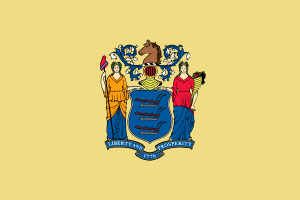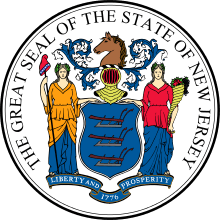Leon Abbett
| Leon Abbett | |
|---|---|
 | |
| 26th Governor of New Jersey | |
|
In office January 15, 1884 – January 18, 1887 | |
| Preceded by | George C. Ludlow |
| Succeeded by | Robert Stockton Green |
|
In office January 21, 1890 – January 17, 1893 | |
| Preceded by | Robert Stockton Green |
| Succeeded by | George T. Werts |
| Member of the New Jersey General Assembly | |
|
In office 1864–1866 1869–1870 | |
| Member of the New Jersey Senate | |
|
In office 1875–1877 | |
| Personal details | |
| Born |
October 8, 1836 Philadelphia, Pennsylvania |
| Died |
December 4, 1894 (aged 58) Jersey City, New Jersey |
| Political party | Democratic |
| Spouse(s) | Mary Briggs |
| Religion | Protestant |
Leon Abbett (October 8, 1836 – December 4, 1894) was an American Democratic Party politician, and lawyer, who served two separate terms as the 26th Governor of New Jersey, from 1884 to 1887 and from 1890 to 1893. He was a member of the New Jersey General Assembly, New Jersey Senate, a Democratic Party candidate for the U.S. Senate, and a Justice of the New Jersey Supreme Court.
Biography
Abbett was born in Philadelphia, the son of Ezekiel and Sarah (Howell) Abbett. He attended Central High School and graduated in 1853. He was admitted to the Philadelphia bar in 1858. In April 1861, he moved to New York to open a law firm and formed a partnership with William Fuller. Abbett married Mary Briggs of Philadelphia in 1862 and the couple moved to Hoboken, New Jersey.
In 1864, Abbett entered politics and was elected as a Democrat to the New Jersey General Assembly, where he served from 1864 to 1866; and 1869–1870 when he was also the Speaker. He also served one term in the New Jersey Senate from 1875 to 1877 and was Senate President in the 1877 session. Abbett was elected Governor of New Jersey in 1883 (defeating Jonathan Dixon in 1883 and Civil War hero E. Burd Grubb in 1889) and served two non-consecutive terms from 1884 to 1887 and again from 1890 to 1893.
Abbett was endearingly known as the "Great Commoner", and was well liked by the impoverished urban lower class as well as the poor, agrarian community. Abbett was a natural leader and he successfully aroused enthusiasm among the lower classes who had been demoralized by big business and concentrated wealth, due to labor unrest, ethnic conflict and a generation of agricultural malcontent. He worked to voice the concerns of the common man who had been oppressed by unrestrained capitalism and special privilege. A series of laws were initiated by Abbett, designed to better industrial employment conditions. The use of Pinkerton detectives in strikes and yellow-dog contracts were outlawed. He also banned convict and child labor and established wage, maximum hours, and occupational health and safety standards.
The most significant act of Abbett's career was his effort to tax the railroads. This was a risky venture for Abbett and although he succeeded, he paid a heavy price. Using their political influence, the powerful railroads defeated him when he ran for U.S. Senate in 1887. In 1893, he was appointed a judge on the state supreme court after again, unsuccessfully running for Senate. Abbett died in 1894 in his Jersey City, New Jersey home after an attack of diabetes.[1] He was buried in Green-Wood Cemetery in Brooklyn, New York.
Abett was a Freemason. He a Master of Mystic Tie Lodge No 272 in New York, but later moved to Varick Lodge No 31 in Jersey City, New Jersey. He was the Grand Representative of Ireland near the Grand Lodge of New Jersey from 1886 to 1894. He was also a Royal Arch Mason, a member of Ancient Chapter No 1, New York City. [2]
References
- ↑ "Leon Abbett Is Dead. New Jersey Supreme Court Justice Succumbs to Long Illness" (PDF). The New York Times. December 5, 1894. p. 5. Retrieved October 13, 2009.
- ↑ Denslow, William R. 10,000 Famous Freemasons, Vol. I, A-D.
Further reading
- Richard A. Hogarty, Leon Abbett's New Jersey: The Emergence of the Modern Governor, Memoirs of the American Philosophical Society, Vol. 243, 2002. ISBN 0-87169-243-0
- Who Was Who in America, Historical Volume, 1607–1896. Chicago, IL: Marquis Who's Who, 1967.
- Hogarty, Richard A.. "Abbett, Leon. "Encyclopedia of New Jersey. 2nd ed. 2004.
External links
- Biography of Leon Abbett (PDF), New Jersey State Library
- New Jersey Governor Leon Abbett, National Governors Association
- Dead Governors of New Jersey bio for George C. Ludlow
| Political offices | ||
|---|---|---|
| Preceded by William J. Sewell |
President of the New Jersey Senate 1877 |
Succeeded by George C. Ludlow |
| Preceded by George C. Ludlow |
Governor of New Jersey January 15, 1884 – January 18, 1887 |
Succeeded by Robert Stockton Green |
| Preceded by Robert Stockton Green |
Governor of New Jersey January 21, 1890 – January 17, 1893 |
Succeeded by George T. Werts |
| Party political offices | ||
| Preceded by George C. Ludlow |
Democratic Nominee for Governor of New Jersey 1883 |
Succeeded by Robert Stockton Green |
| Preceded by Robert Stockton Green |
Democratic Nominee for Governor of New Jersey 1889 |
Succeeded by George Theodore Werts |

